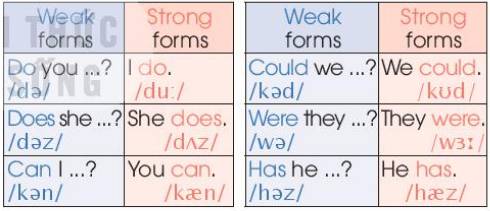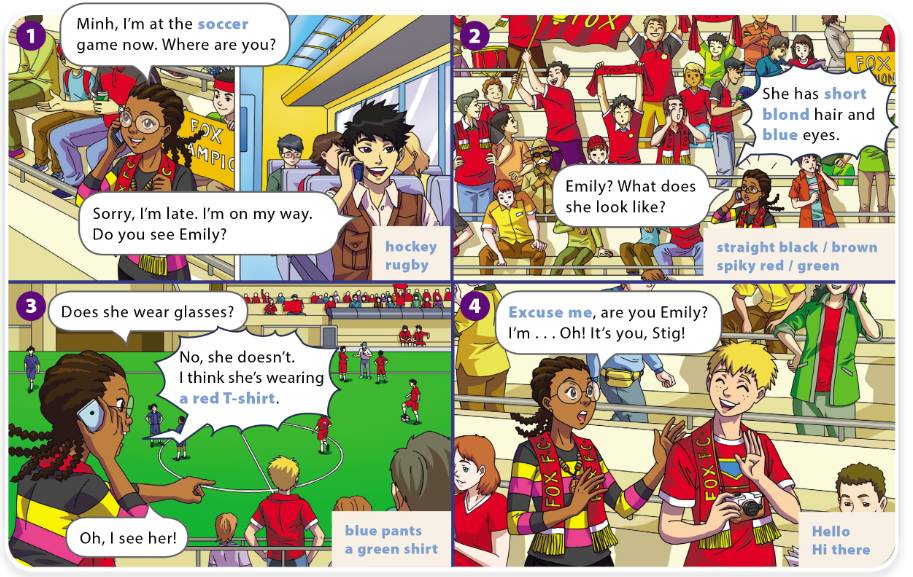Listen and repeat. Then practise saying the words.

PRONUNCIATION Listen and mark the words that are stressed in the sentences from exercise 5. Then practise saying the sentences yourself.
1. When a Russian space CAPSULE had a major PROBLEM in 1971, the COSMONAUTS DIED in less than 30 SECONDS.
2. In 1966, a SCIENTIST PASSED out after 15 SECONDS in a VACUUM.
3. The SCITENTIS PASSED out for 27 SECOND.
4. In the 1960s, Randy Gardner STAYED awake for more than 250 HOURS.
5. After STAYING awake for so long, randy Gardner then SLEPT for almost 50 HOURS.
Listen and repeat. Pay attention to the strong and weak forms of the auxiliary verbs. Then practise saying them.

Mark: Have you started working out again?
/hǝv/
Nam: Yes, I have.
/hæv/
Mark: Was it your grandfather who taught you?
/wəz/
Nam: Yes, it was.
/wɒz/
Underline the stressed words in the sentences. Listen and check. Then practise saying the sentences with a natural rhythm.
1. The village was completely destroyed by floods.
2. Some gases are released into the air through human activities.
3. Has the earth’s temperature increased in the past few years?
4. Some environmental disasters wil become more frequent.
Listen and underline the stressed words. Then practise saying the sentences with a natural rhythm.
1. Forests are helpful in cooling down our planet.
2. Plants can store a lot of carbon in their roots, branches, and leaves.
3. Oceans can also remove carbon from the atmosphere and store it.
4. Oceans may start releasing the carbon they store as global temperatures rise.
1. helpful và cooling.
2. plants, store, carbon, roots, branches, leaves.
3. oceans, remove, atmosphere, store.
4. oceans, start releasing, carbon, store, global, temperatures, rise.
5. Read the Learn this! box. Underline all the consonant clusters and practise saying the words. Then listen and check.
(Đọc hộp Learn this! Gạch chân tất cả các cụm phụ âm và luyện đọc các từ. Sau đó nghe và kiểm tra lại.)
LEARN THIS! Consonant clusters(Cụm phụ âm)
Consonant clusters, combinations of consonant sounds. can be found at the beginning, at the end or within words. (Cụm phụ âm, sự kết hợp giữa các âm phụ âm, có tìm ở đầu, ở cuối hoặc giữa các từ.)
prefer /pr/ British /br/ ogfee/gr/ restrict/std accept /pt/ tasks/sks/
shrink twin problem scream adopt address three next against hops
shrink/shr/ twin/tw/ problem /pr/ scream/scr/ adopt/pt/ address/ddr/ three/thr/ next/xt/ against/st/ hops/ps/
Listen and underline words with elision. Then practise saying the sentences in pairs.
1. There are no correct answers on her test paper.
2. He’s going to fly to Bangkok tonight.
3. The participants were probably excited about the palace history.
4. I believe that members expressed different opinions about the issue.
III) Complete the following sentences with the correct words from the table, and then read aloud the sentences. Practise saying the words with the cluster /bl/ or /kl/.
classical | blouse | cleaning | blanket | blackberry |
clerk | blank | block | clearly | blind |
16. Fill in each _____________ in the following exercise.
17. Itˆs cold tonight can I have another ____________?
18. She has been ___________ since her birth.
19. A ____________ is a piece of clothing that women wear.
20. My shoes need ____________.
21. It was so dark that we couldnˆt see the road ________________.
22. I prefer _____________ pie for desserts.
Listen and read. Then repeat the conversation and replace the words in blue.

Hướng dẫn dịch
1.
Nadine: Minh, tớ đang ở sân bóng. Câu ở đâu?
Minh: Xin lỗi, tớ muộn rồi. Tớ đang ở trên đường. Cậu có gặp Emily không?
2.
Nadine: Emily? Cô ấy trông thế nào vậy?
Minh: Cô ấy có mái tóc ngắn,màu vàng và mắt xanh.
3.
Nadine: Cô ấy có đeo kinh không?
Minh: Không, cô ấy không. Tớ nghĩ cô ấy đang mặc áo phông màu đỏ
Nadine: À tớ thấy cô ấy rồi
4.
Nadine: Xin lỗi, cậu có phải Emily không? Tớ là… Ồ xin lỗi , là cậu à Stig
Listen and complete the conversation. Then underline the weak forms of the auxiliary verbs, circle the contracted forms, and mark the consonant-to-vowel linking with (‿). Practise saying the conversation in pairs.
A: What's it like living (1) _________ skyscraper?
B: (2) __________ great. I (3) __________ enjoy the best views (4) ___________ the city from my sofa.
A: (5) __________ have a balcony?
B: No, (6) ___________. (7) ___________ huge windows.
Example:

(1): in a
(2): It is
(3): can
(4): of
(5): Do you
(6): I don't
(7): But I have
Listen and repeat. Pay attention to the intonation. Practise saying the questions in pairs.
1. Should we focus our campaign on a general social issue  or one affecting mainly teens
or one affecting mainly teens  ?
?
2. Is the top problem facing teens today peer pressure  , body shaming, or bullying
, body shaming, or bullying  ?
?
1. Should we focus our campaign on a general social issue or one affecting mainly teens?
(Chúng ta nên tập trung chiến dịch của mình vào một vấn đề xã hội chung hay một vấn đề ảnh hưởng chủ yếu đến thanh thiếu niên?)
2. Is the top problem facing teens today peer pressure, body shaming, or bullying?
(Vấn đề hàng đầu mà thanh thiếu niên ngày nay phải đối mặt là áp lực từ bạn bè, sự xấu hổ về cơ thể hay bắt nạt?)